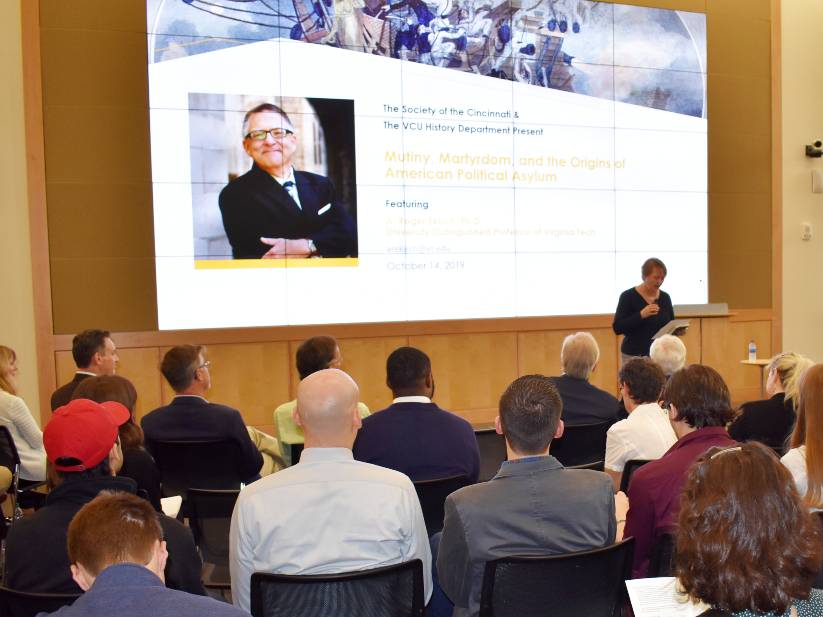What is the Society of the Cincinnati Lecture? Carolyn Eastman, Ph.D. has the answers
Sept. 6, 2024

What is the Society of the Cincinnati Lecture?
The lecture came from a patriotic organization of men who descend from those who served specifically in Washington’s army during the Revolution. It is this group of men here in Virginia who help educate the public and commemorate the history of the revolutionary era, especially the political, economic and military aspects of that period.
Their program benefits VCU students and faculty as well as several other colleges and universities in Virginia. I serve as the intermediary between them and the VCU community to find speakers who are doing exciting new work on this topic that can reach our student body and faculty. They have been wonderfully generous to give us the funds that allow us to invite prominent scholars in this field to speak once a year.
What are some examples of lecture topics?
We've offered a wide variety of lectures that fit within the political, military, and economic history of the revolutionary era. For example, we had a wonderful lecture on “The Men Who Lost America,” those British generals and political leaders, like King George III, whose actions failed to win the war. We have also had lectures on the idea of how the word “democrat” became increasingly popular during the late 1790s as Americans supported the French Revolution and were inspired with increasingly radical revolutionary fervor.
We featured a terrific lecture on the Boston Massacre, not looking at the famous scenes that are in textbooks, but rather on the more intimate, family story of the British soldiers who had been living in people's homes. Some of them had gotten married to Bostonian women, became part of Bostonian families, and so the story of the Boston Massacre was much more complicated than we ever realized.
What is this year’s lecture topic on?
I'm excited! This year's lecture will be delivered by Friederike Baer, who has written a multiple-prize winning book, Hessians: German Soldiers in the American Revolutionary War. These men, often called mercenaries, hired by the British army to beef up their numbers and who were known to be especially fierce fighters. She’s done an amazing job of explaining the reasons why the British hired them but also to show these men's lives and their experiences.
What is the upcoming anniversary?
2026 will mark the 250th anniversary of the Revolution. There are a lot of new books coming out, a lot of attention coming to this subject. It’s a nice opportunity to reflect on the question of, what does the Revolution mean to us—and what should it mean to us—because it means something a little bit different to everyone.
Indigenous Americans often take a bleak view of the Revolution because their ancestors really lost a lot with the signing of the Treaty of Paris in 1783. What does the Revolution mean to African Americans? To the descendants of the loyalists, many of whom left the United States after the war for Canada, Britain, Africa, Australia, and elsewhere?
It’s an interesting opportunity to think of not just glorious, big ideas that came out as a result of the Revolution, but also to think about whose Revolution was it? Who won and who didn’t do so well? It’s a fascinating moment for reflection.
Are there plans in the works for future lectures?
I've been reading a brand-new work from a scholar at Berkeley named Brian DeLay, whom I'd love to invite for 2025. It would be a challenging topic because it’s about guns. The book isn’t done yet, but from what I’ve seen so far shows that the Revolution marked a key turning point in the number of guns in the United States—a subject that reminds us of how many guns we have in this country today.
For 2026 I’d like to think about finding someone who can speak about what the Revolution means for a wide variety of different people in the U.S. and internationally today. That would be really wonderful. Last year, the representative from the Society of the Cincinnati got up and made a few remarks, including saying that “It has never been more important than now to be a history major.”
He's right! I believe that thoughtful discussion of the revolutionary era—examining the full, complex picture of what happened, rather than just the patriotic stories we learned as children—has the potential to help us navigate our current political culture (which is also complex, and fascinating). History majors embrace that complexity and multiple perspectives on the past. I'm so pleased that the Society has made it possible to bring these conversations to our VCU community.